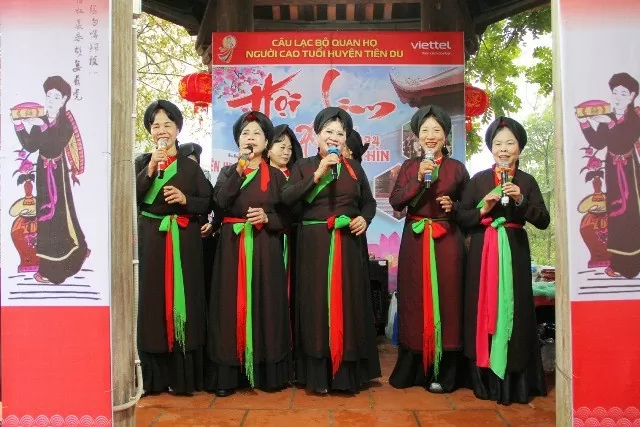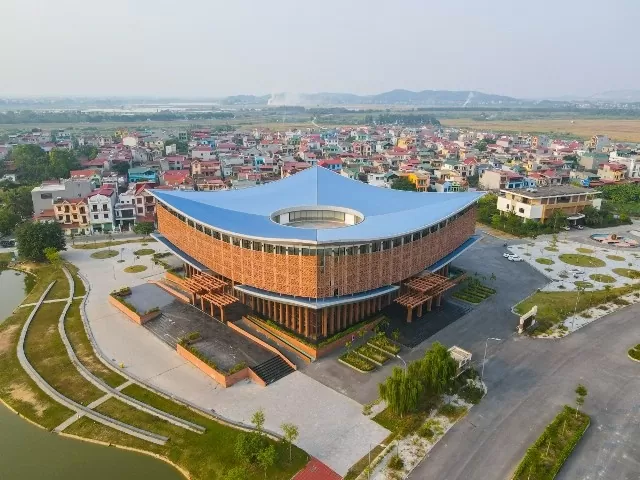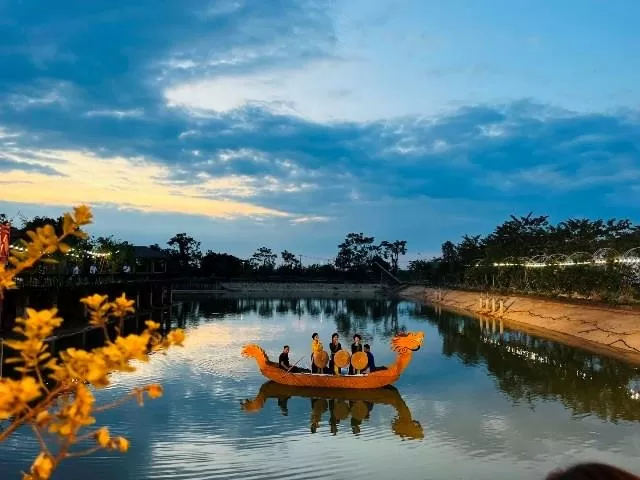
Bac Ninh: Promoting cultural identity in tourism development
Latest
 |
| Bac Ninh:Quan ho Bac Ninh folk songs were inscribed on the Representative List of the Intangible Cultural Heritage of Humanity on September 30, 2009. |
According to experts, creating attractive and unique products is a necessary requirement for Vietnam's tourism industry to attract tourists. However, in the context where many localities are increasingly developing tourism areas that "borrow and copy" foreign cultural features, even creating large-scale replicas of architectural spaces and cultural symbols from other countries, there is a risk of local culture becoming obscured or even overshadowed by foreign cultures. Although these products may help boost tourism demand in the short term, in the long run, a tourism industry can only develop sustainably if it is built on the cultural identity of its own nation and locality.
Culture as a Resource for Tourism Development
According to the Bac Ninh’s provincial Department of Culture, Sports, and Tourism, in any tourism activity, most tourists always seek new experiences and wish to explore the land and country they visit from various aspects: customs and traditions, beliefs, traditional festivals, historical sites, architecture, performing arts, cuisine, handicrafts, and other cultural products. The experiences that tourists aim for are cultural differences. The cultural identity of regions, ethnic groups, and localities is what attracts tourists from different regions of the country and even from other nations.
For Bac Ninh province, this has long been considered a land of culture and revolution, a homeland of many cultural heritages, significant historical sites, and some of the most famous traditional craft villages in Vietnam, recognized by the world. Therefore, tourism has been identified as an important economic sector in the local socio-economic development strategy for many years.
Mr. Trinh Huu Hung, Director of the Department of Culture, Sports, and Tourism of Bac Ninh, said that to preserve and promote cultural identity in conjunction with tourism development, the project "Promoting the Value of Cultural Heritage in Association with Tourism Development in Bac Ninh Province for the Period 2021-2025, with a Vision to 2030" has set a goal to receive and serve over 5 million tourists, making Bac Ninh one of the major cultural tourism centers in the country.
According to Mr. Hung, the province is striving to develop tourism that matches its potential and advantages in cultural heritage; to develop tourism infrastructure and technical facilities towards modernity, professionalism, and smart tourism. Additionally, according to the project, during the 2025-2030 period, Bac Ninh's tourism industry will prioritize developing from 3 to 5 tourism products based on outstanding cultural heritage values to diversify products and build the province's tourism brand. Accordingly, the province will have at least two provincial-level tourist areas and 1 to 2 community-based tourism models from Quan ho villages, traditional craft villages, agriculture, and rural areas.
 |
| Bac Ninh: Bac Ninh Quan Ho Folk Song Theater for the traditional Quan Ho listening space. |
The province will invest in developing tourism products featuring the Quan ho Bac Ninh (Bac Ninh’s folk singing) folk songs and various traditional folk arts such as water puppetry, Trong Quan singing (alternating singing with military drum), Cheo (traditional operetta), and Tuong (classical Vietnamese opera). The Quan ho Bac Ninh Folk Song Theater will become a destination, regularly organizing art performances, cultural exchanges of Quan ho and various folk arts domestically and internationally, and displaying and exhibiting the Quan ho cultural space. The theater will also be open regularly to serve visitors and tourists.
Cultural Identity as a Tourist Attraction
Mr. Nguyen Xuan Con, Head of the Tourism Management Department (Bac Ninh provincial Department of Culture, Sports, and Tourism), said that Bac Ninh's tourism activities have seen significant changes, with a strong connection between tourism and culture. Notably, the cultural beauties of Bac Ninh are always associated with rural areas rich in Northern cultural characteristics. Meanwhile, the current tourism trend is gradually shifting from traditional tourism in confined spaces to new types of tourism, such as green tourism, prioritizing nearby destinations, safe domestic experiences, and nature-friendly trips with spacious, airy environments.
Therefore, developing tourism products linked to agriculture and rural areas, along with the New Rural Development Program, is an innovative approach that is yielding dual benefits. It not only contributes to positively transforming the rural landscape but also enhances the role and position of farmers in the agricultural and rural tourism chain. This has also been identified as one of the key solutions and tasks for rural economic development in connection with the National Target Program on New Rural Development for the 2021-2025 period.
Recently, Bac Ninh tourism has expanded into new development directions. Many groups and individuals have invested in developing homestay, eco-tourism services combined with cultural value experiences and explorations of traditional culture. This includes the development of agricultural farm tourism combined with sightseeing, taking photos, shopping for agricultural products, and enjoying local specialties. Notable examples are Delco Farm High-Tech Agricultural Farm in Thuan Thanh; the perilla greenhouse model in Luong Tai; Ngam Mac Safe Vegetable Cooperative in Gia Binh; and the High-Tech Agricultural Experiment Production Center in Tien Du, all of which offer interesting experiences that attract visitors from both within and outside the province. These initiatives provide a foundation for expanding and developing tourism in the province.
 |
| Bac Ninh: Singing Quan Ho at Green Farm cultural eco-tourism area, Tien Du district, Bac Ninh. |
Mr. Phạm Duc Hieu, a member of the Bac Ninh Province Startup Investment Club, shared that stemming from the idea of "Developing High-Tech Ecological Agriculture Combined with Experiencing, Promoting Agricultural Products, and Preserving Traditional Cultural Values," he invested in the Green Farm cultural eco-tourism area in Tien Du district. This project aims to create an open space focused on traditional architecture, lush greenery, spacious and quiet premises, fresh air, and a close connection to nature. The overall complex is planned into various zones where visitors can enjoy high-tech agricultural products, participate in agricultural activities, engage in folk games, experience pottery making, Dong Ho painting, and performances of folk songs on boats, including Quan ho and Ca tru singing.
“Thanks to the combination of various types of services, we can cater to and meet the needs of many tourists from different age groups while contributing to the preservation and promotion of traditional cultural values and the intangible cultural heritage of the province,” said Mr. Hieu.
With the advantage of tourism potential, in the upcoming time, Bac Ninh’s tourism sector will continue to focus on implementing the approved tourism plans and projects. The sector will invest comprehensively in the restoration, upgrading, and preservation of cultural heritage and historical sites, as well as infrastructure and environmental landscape, to attract tourists. Additionally, efforts will be intensified to promote and advertise Bac Ninh tourism, particularly cultural tourism with its seven distinctive features: the homeland of Quan ho folk songs, spiritual culture, historical and scholarly traditions, festivals, academic achievements, traditional craft villages, and architecture.
Moreover, Bac Ninh aims to link with neighboring provinces and cities, especially Hanoi, to develop tourism, particularly cultural tourism, leveraging the advantages of national and especially significant national relics, according to the Bac Ninh Department of Culture, Sports, and Tourism.

















